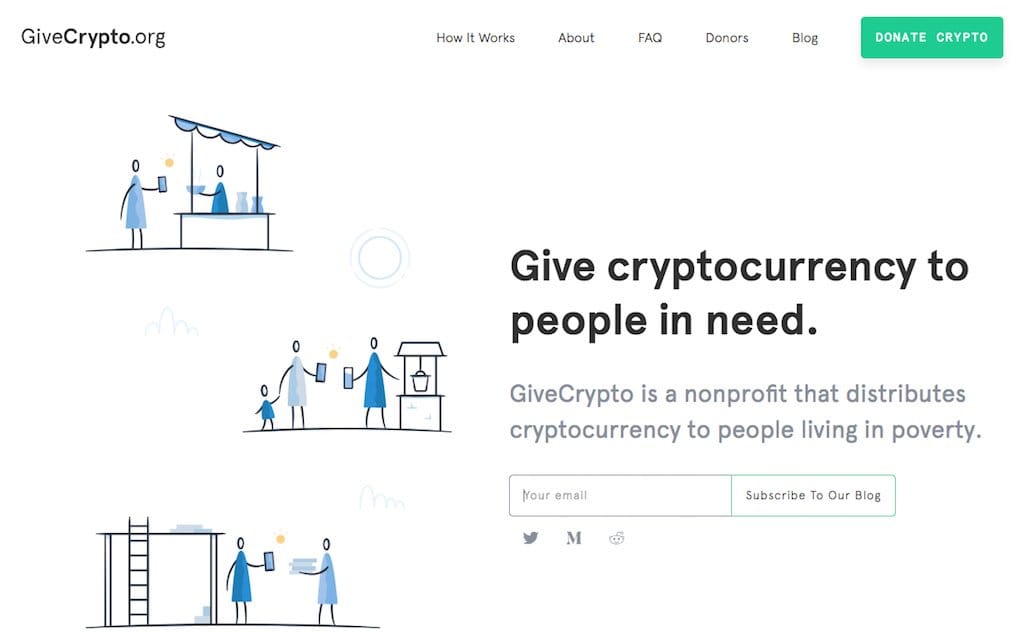GiveCrypto.org: donations in cryptocurrency to people in need
GiveCrypto.org is a new international non-profit organization that uses blockchain technology to provide targeted assistance to those in need. The organization accepts and issues donations in cryptocurrency. Anyone can make a contribution and then keep track of who the money was sent to and what it was spent on.

Why it’s important
40 million people around the world already own cryptocurrency. Large cryptocurrency funds are beginning to use it for social projects. In March 2018, the Ripple Foundation donated $ 29 millionin cryptocurrency for the needs of public schools in the United States. The Pineapple Fund has donated $ 55 million in bitcoins to charity programs.
Cryptocurrency allows for almost instantaneous transfer of amounts, bypassing complex banking operations and commissions for international transactions. A little targeted help in this case becomes prompt and effective.
How a cryptocurrency NGO works The
process of collecting and issuing donations consists of three steps:
1. The donor transfers the cryptocurrency to the GiveCrypto.org account;
2. NGOs distribute donations and make direct transfers to those in need;
3. People use money for food, medicine, education.
The transfer is made to a personal account or by e-mail to the recipient. Then a person who received funds, say in bitcoins, can exchange them for real money in their country.
The author of the idea and the founder of the cryptocurrency NGO GiveCrypto.org Brian Armstrong , the founder of the open financial system @ Coinbase.Building.
"Our first goal is to raise $ 10 million in donations. We recently opened, but have already been able to raise $ 3.5 million. With our project and concrete deeds, we want to encourage and inspire new philanthropists to donate. " Brian Armstrong, founder of GiveCrypto.org According to the
author of the project, although billions of people around the world have mobile phones, many still do not have access to financial services. According to the dataWorld Bank , more than 1.7 billion adults do not have a bank account and access to banking services.
Author Oleg Gant

Why it’s important
40 million people around the world already own cryptocurrency. Large cryptocurrency funds are beginning to use it for social projects. In March 2018, the Ripple Foundation donated $ 29 millionin cryptocurrency for the needs of public schools in the United States. The Pineapple Fund has donated $ 55 million in bitcoins to charity programs.
Cryptocurrency allows for almost instantaneous transfer of amounts, bypassing complex banking operations and commissions for international transactions. A little targeted help in this case becomes prompt and effective.
How a cryptocurrency NGO works The
process of collecting and issuing donations consists of three steps:
1. The donor transfers the cryptocurrency to the GiveCrypto.org account;
2. NGOs distribute donations and make direct transfers to those in need;
3. People use money for food, medicine, education.
The transfer is made to a personal account or by e-mail to the recipient. Then a person who received funds, say in bitcoins, can exchange them for real money in their country.
The author of the idea and the founder of the cryptocurrency NGO GiveCrypto.org Brian Armstrong , the founder of the open financial system @ Coinbase.Building.
"Our first goal is to raise $ 10 million in donations. We recently opened, but have already been able to raise $ 3.5 million. With our project and concrete deeds, we want to encourage and inspire new philanthropists to donate. " Brian Armstrong, founder of GiveCrypto.org According to the
author of the project, although billions of people around the world have mobile phones, many still do not have access to financial services. According to the dataWorld Bank , more than 1.7 billion adults do not have a bank account and access to banking services.
Author Oleg Gant